Changing of the guard


Allen Lessels
Photography by
Jeremy Gasowski

hampionships have been hosted and trophies have been hoisted. The Whittemore Center has gone through renovations, there’s a welcoming new student-athlete academic center in the Field House, and Wildcat Stadium stands tall on the former site of Cowell Stadium. The best teams in the country have battled in NCAA national and regional competitions hosted by the UNH athletics department.
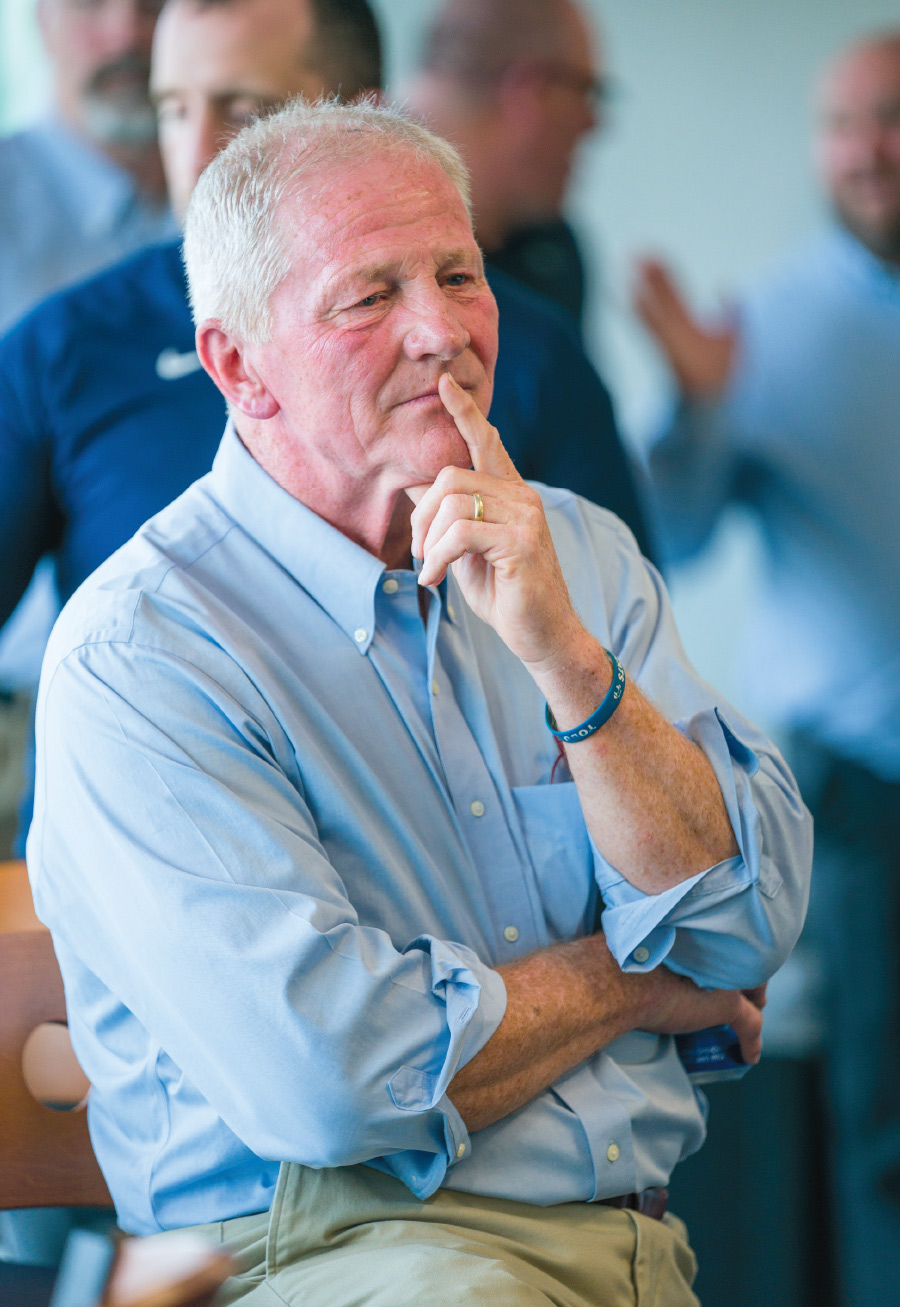
Yes, it’s been a busy time in UNH Athletics these last two decades. And for Athletics’ leaders like Athletics Director Marty Scarano and Head Football Coach Sean McDonnell, looking back over their UNH tenures offers some bittersweet reflection.
“I’ve loved the people I’ve worked with, all of them, those present and those in the past. That’s what makes UNH so great. It isn’t about any one individual. It’s about us collectively,” he says.
With Scarano’s and McDonnell’s retirements comes a new dawn for Athletics as both look back on their legacies: Facilities and physical spaces are being upgraded. UNH student-athletes continue to stun fans and make headlines with their work on the field and in the classrooms. And having just led their athletes, coaches and staff through a pandemic that wreaked havoc on collegiate sports nationwide, McDonnell and Scarano are looking ahead to what UNH’s student-athletes, coaches and staff will accomplish.
‘Tradition, Pride, Excellence’
“We’ve experienced some of the very best things college athletics has to offer for young men and women,” Scarano says. “We’ve had people stand on podiums for championships and we’ve had very, very, very successful coaches along the way. I will say one of the reasons I came here was because of the quality of coaches, that’s one thing I knew about. I knew about Coach Umile and Coach Bowes and Jim Boulanger and Robin Balducci and Gail Goodspeed and Cory Schwartz. Some coaches have gone, and some new coaches have come in to replace them.”
He loves how his coaches, staff and athletes embrace the Wildcat way of doing the most with what is available to them.
“We’ve done some wonderful things with sometimes not the resources that some of our competitors have,” Scarano says. “We’ve had to outwork people and outthink people and have a lot of grit and grind. You look at the great coaches UNH has had. They are that blue-collar, lunch bucket type, collectively. I hope that doesn’t change here. It’s something that distinguishes us from some other institutions.”
Scarano arrived at UNH in the summer of 2000 off a four-year stint as AD at Colorado College. Prior to that, the Penn State graduate spent 13 years at Colgate University during which he held a variety of positions and was senior associate director of athletics and director of physical education when he left.
He announced his retirement from UNH in late November 2021.
“It’s a great time for change,” Scarano says. “So many things are going to be transformed as far as the NCAA and how you look at working with student-athletes in even the next five years. It’s a great opportunity for UNH to have a new voice and I’m excited about that.”
In Scarano’s time, the Wildcats have captured 60 league championships, produced more than 100 All-Americans, boasted 61 conference coach of the year recipients, one national champion (Elle Purrier, 2018) and a national championship runner-up (men’s hockey, 2003).
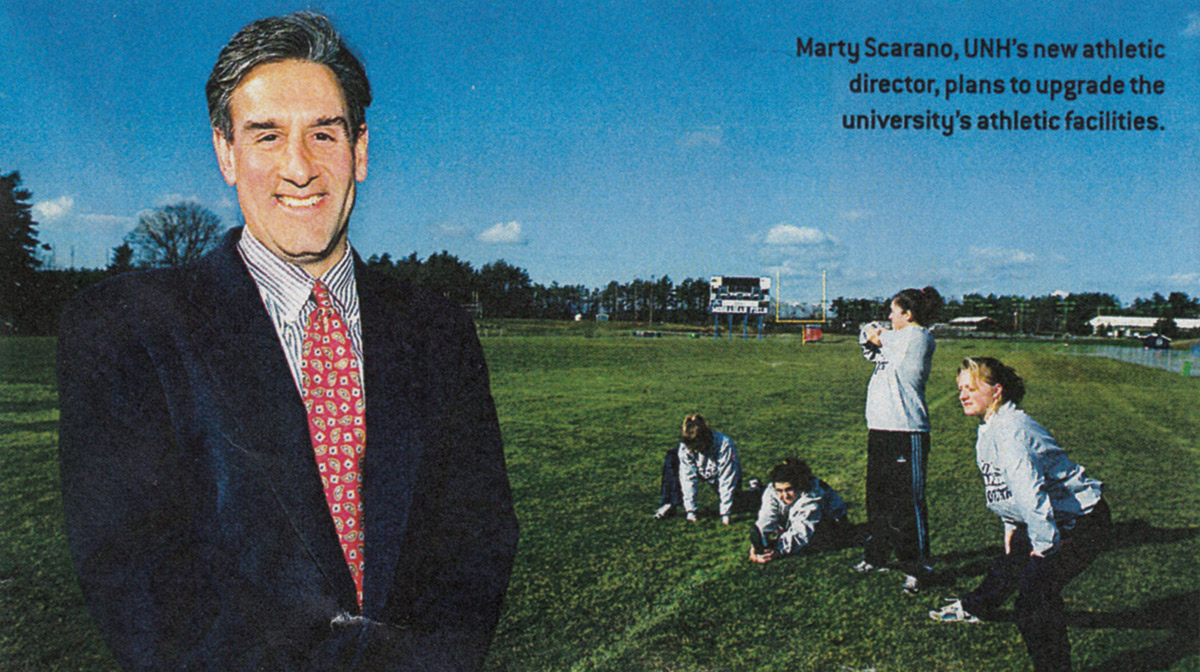
“One byproduct of that is what a lot of people would say is our crowning glory, Wildcat Stadium,” Scarano says. “I’m proud of that and pinch myself when I stand out there and look at it. A lot of people worked awfully hard to make that happen, not the least of whom is Sean McDonnell. If he didn’t have the success he had with his program, we wouldn’t have the stadium. I always come back to that.”
Phase 1 of the Tucker Field project, completed in the summer of 2019, featured a $3.7 million investment in a state-of-the-art synthetic field that serves as the current practice field and future home stadium for Wildcat men’s and women’s soccer programs and the women’s lacrosse program in addition to hosting Oyster River Youth Association events.
Wildcat student-athletes have excelled in academics during his administration. In the spring of 2015, UNH opened the $2 million Watkins Center for Student-Athlete Excellence at the Field House. Funded by private donations, which supports student-athletes by offering individual and team-based programs for personal growth, life skills, academic support, career planning, networking and community service.
“I take great pride in many things we’ve done and much of that goes back to the people who have come through here, many of whom I’ve hired,” Scarano said. “I think of Wildcat Stadium and the Academic Center and Whittemore Center renovations and video boards and then you move into championships. You have people who have passion for what they do and surround yourself with the right people, and those things will come.”
In November 2020, the UNH athletic department earned an NCAA Graduation Success Rate of 95%, which was No. 2 nationally among land-grant universities, and the university has won the America East Academic Cup for highest cumulative GPA four times in the last seven years (2015, 2016, 2017, and 2019).

“He’s devoted his years here working closely with the coaches, staff and our student-athletes and supporting their success. And he’s done it quietly and without fanfare, and I respect that,” says Mike Hickey, chairman of the UNH Athletics Advisory Board. In a nod to the UNH Athletics motto emblazoned on a wall of the Field House, Hickey continued, “Tradition, pride, excellence. That’s what Marty is all about and it’s reflected in everything he’s done; from the people he’s hired to the student-athletes he worked with.”
Once such athlete is Faith Bonett ’22 ’23G, a forward on the women’s basketball team. The New Jersey native had a rough freshman year: she tore her ACL, had surgeries, and then had complications from those surgeries. She wasn’t on campus very much, and so didn’t have the chance to bond with her team or the athletics coaches and staff like she had wanted to.
But she came back sophomore year, ready to play. It was a home game that December that had her path cross with Scarano’s in a mid-game moment that would stick with her. During the game, she collided with a teammate, pretty hard. “It was like when you have the wind knocked out of you, but I had the wind knocked out of my knee in a way,” she explained.
An athletic trainer checked Bonett out courtside, but it was Scarano’s actions that surprised her. “I remember he came over across the gym to check on me and make sure I was OK,” she recalls. “He was giving me ‘You got this’ encouragement.
A teammate would later point out: ‘That’s not normal, usually your AD isn’t going to come over and check in on you in the middle of a game like that,’’ Bonett recalls. “It was a gesture that really made an impact.”
For Bonett, that moment kicked off a friendship between the two; with Marty’s door more often open than closed in the Field House, she would walk past on her way to games or practice, stopping in to say a quick hello to catch up.
“If there was a home game, Marty was there; if he wasn’t it was because there was another home game going on… even during COVID, he was right there cheering us on.”
Bonett was a member of the Student Athlete Advisory Committee (SAAC), a group that represents the voice of student-athletes with administration, and hosts regular events throughout the academic year, including food pantry fundraiser tourneys, and “stress less” weeks for athletes in the fall and spring semesters.
“Marty has always been willing to answer any questions or concerns we’ve brought to him through SAAC; he never was sliding things under the rug with us,” she says.
Bonett recalled her sophomore-year Marty moment during the Fourth Annual Senior Showcase and a Night at the WESPYs (Wildcat Excellence in Sports Performance Yearly Awards) in May, when she and others presented Scarano with an award on behalf of all the student-athletes.
“Obviously, being an athletic director is a job, Marty could have sat in his office for every game if he wanted to, but he made it a priority to be a UNH athletics fan… I think that reflects more on his character than anything else.”
Player, Coach, Mentor and More
There, McDonnell and standout young quarterback Ricky Santos and his teammates, the coaching staff, director of athletics Marty Scarano and others close to the program watched the NCAA Tournament Selection Show intently, waiting for the news to flash across the television screen.
The Wildcats knocked off Maine, their bitter rivals from the north, in Orono the day before to close out the regular season with a 9-2 record and knew they had done enough to advance to the 1-AA (now known as the Football Championship Subdivision) playoffs for the first time in a decade. The only suspense remaining was to find out what team and where they would be playing in their first-round game.
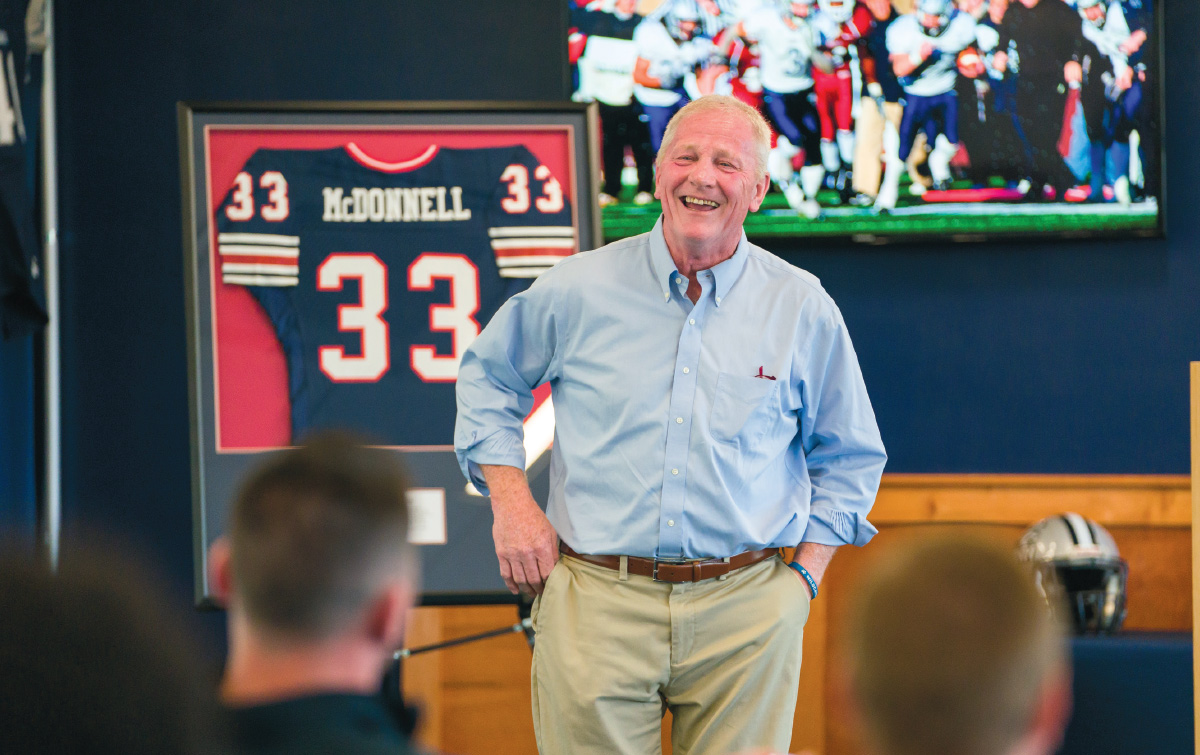
Amid the revelry, assistant coach and offensive guru Chip Kelly — never one to shy away from a challenge — sidled up to McDonnell and moved in close to point out: “They’re really, really good.”
True that. In fact, the Eagles and their six national championships were the class of FCS football in those days.
The Wildcats, too, were really, really good — and on their way to becoming even better, evolving into an elite team, renowned and respected across the nation.
That 2004 season — and in particular a Thanksgiving Weekend game at Georgia Southern — stands as a UNH athletics department milestone.
For several reasons.
McDonnell took over as head coach in 1999, replacing his own coach at UNH, Bill Bowes, a National Football Foundation College Football Hall of Famer.
Between the two of them, Bowes (27 years, 175 wins) and McDonnell (23 years, 157 wins) guided the Wildcats for a half a century, piling up wins and championships and carving a legacy of success built on a foundation of teams that carried a reputation of having hard-working, hard-hitting players.
Less than a week after McDonnell broke his retirement news last fall, Scarano announced that Rick Santos, the quarterback who led UNH back to the playoffs and into that Georgia Southern game as a redshirt freshman in 2004, was taking over as the new head coach of the Wildcats.
“We’ve had one coaching change the last 49 years,” Scarano said when introducing Santos. “It’s hard to get your head around that. It’s quite a phenomenal legacy those two men (Bowes and McDonnell) have left us. They established a program of national renown and most importantly, and this is what Rick embraces, it’s playing the game the right way, with class, integrity and physical toughness.”
Looking Ahead
Santos is four practices into his first spring session as head coach of the team and back in the Field House he stands, just steps away from the locker room where he saw the words “Georgia Southern” jump onto a television screen nearly 20 years before and breaks down what he’s seen so far from his team.
Osho Omoyeni ’22 ’23G has emerged as a leader on the offensive line, Dylan Laube ’22 ’23G has shown his trademark explosiveness at running back, Noah Stansbury seems to be making a smooth transition from his former position of safety to cornerback and it’s good to have safety Max Oxendine back from injury, the coach says.
“Max brings a lot of energy out there,” Santos says. “He has a ton of fun.”
That’s one of the goals Santos has for the 2022 season and beyond: bring a little more fun to the program. The 2021 season was tough and nothing that anyone involved with the program has any interest in repeating. It was time for a change, time for a new person with a new voice to lead the program, McDonnell says. Scarano and McDonnell have no doubt that Santos — who as a player helped UNH reach its greatest heights ever and start an enviable run of success — is the person to lead the way going forward.
“In his playing career, I always thought Rick was really good at reading situations and understanding the chain of command,” McDonnell says. “He was the real deal from basically the middle of his sophomore year and through his junior year, and before he became a senior leader, he always deferred to the upper classmen. He’d get on a receiver or get on a running back when necessary, but he was smart about it. He was very, very good at leading.”
As Santos was when McDonnell encouraged him to return to the team after playing in the Canadian Football League and try his hand at coaching as an assistant coach working with receivers. And again, after he left for Columbia University for a few seasons and then came back to be the associate head coach and quarterbacks coach in the spring of 2019.
The job Santos did while taking over for McDonnell on short notice for that 2019 season backs up the confidence both Scarano and McDonnell, who took a medical leave that season to battle cancer, have in the new coach.
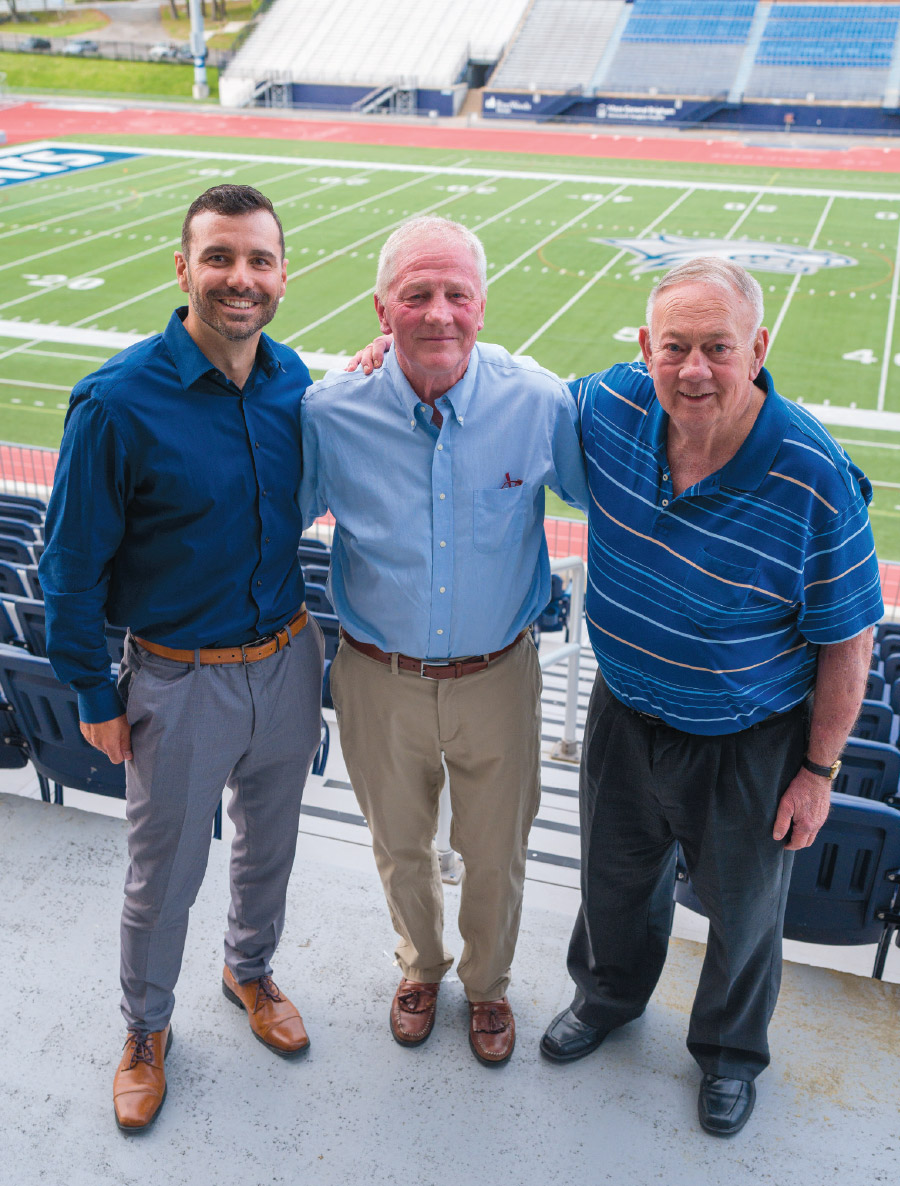
UNH receiver Brian Espanet ’21 believes the program is in good hands as well. Espanet thought he was done playing for the Wildcats. After arriving in 2017 as a freshman and playing through a couple of COVID-impacted seasons and leading the team with seven touchdown catches and 454 yards receiving last fall, that was enough, Espanet figured. He had one year of eligibility remaining but did not intend to use it.
“It was a hard decision,” Espanet says. “In all honesty, I was not planning on coming back.”
Espanet, who wants to go into coaching and work with receivers, admired Coach Mac’s approach.
“We didn’t have to talk,” Espanet says, “We’re both so fiery, sometimes we couldn’t be in the same room. But at the end of the day, he was my dream coach. Honestly, he was. Mike Ferzoco (the team’s receivers coach) was the same way. The energy was the same every day and the energy was high all the time. It was amazing to watch. For the five years I’ve been here, I always thought it would let up for a day, but it never happened.”
Espanet loved it. He loves, too, the excitement Santos brings to the team. Appreciates it so that he decided to change his plans and return for a final season.
The staff has had some turnover, and duties have been adjusted for many. Besides Garrett Gillick taking over for the retired John Lyons as defensive coordinator, and Brian Scott, who had great success at Old Dominion, becoming the fulltime offensive coordinator, Casey DeAndrade, a former Wildcat All American, came back to coach defensive backs. Stephen Barnette, who played at Richmond, is on to work with receivers.
Word is, Santos will allow players to wear white cleats, and not require the black ones that McDonnell preferred.
“There may be a little more sense of freedom, things may be a little more loose, but Rick is still fiery and will get on us and will not put up with any BS,” Espanet says. “He’s still the head coach and we’re going to respect him as such. He does a great job of connecting with all his guys.”
Espanet, by the way, does not expect to change his footwear.
“There may be a little more leeway with the guys,” he says. “If white cleats make you feel good as a player, by all means go with them. I’ll probably go with black as a nod of the cap to Coach Mac.”
The Bar is High
In each of his four seasons as quarterback, Santos carved up the team’s record book — often while connecting with receiver David Ball ’06 — and more importantly played a huge role in getting the Wildcats into the FCS playoffs.
McDonnell, his staff and the players who followed took it from there, building off that foundation and running its streak of making the playoffs to 14, through the 2017 season. Only one team in the nation has qualified for the tournament more times in a row. The Wildcats have not played in the postseason since, though they came close to qualifying with Santos as interim head coach in 2019.
The hope is Santos can rekindle the same magic he unveiled in 2004 and guide the program back to lofty heights.
Because while the way the Wildcats go about their business will be tweaked here and there — Santos moved the spring football schedule ahead by three weeks, for example, to allow the players time to focus more on gaining strength and size as well as letting his staff make better use of recruiting time — the program’s goals and standards will not budge.
“The foundational stuff isn’t going to change, and shouldn’t, in terms of things like the mat drills we do in the offseason,” Santos says. “That’s always been a core staple. There are the traditions we always have to have.”
The tradition of breaking into song in the locker room after each win, home or away, remains.
“We’re always going to do the ‘C-A-T ’Cats’ jumping jacks,” Santos says. “Those things, the ‘One Team, One Heartbeat,’ that we always talk about, those are going to be the same.”
So, too will be the focus on the game against the team’s greatest rival, the University of Maine, which carries not only a ‘Border Battle’ label, but possession of the coveted Brice-Cowell Musket. At the moment, the musket is in Orono and that is not sitting well in Durham.
“The Maine game is huge,” Santos says. “Losing the musket is unacceptable. We talked about that at the beginning of the offseason. There’s a blank spot in our locker room where that musket resides and where we expect it to be.”
As a player, Santos and his teammates helped raise the bar of expectations by starting a 14-year streak of reaching the playoffs that included five consecutive wins over Football Bowl Subdivision teams when the Wildcats stepped up a level and kept winning.
That bar is going nowhere.
“I fancy myself a players’ coach,” Santos says. “With that being said, there’s still going to be a level of expectations I hold these guys to, and a standard they have to uphold. I want to be relatable and I want to be fresh with some of the things. I’m also going to set that bar extremely high.”
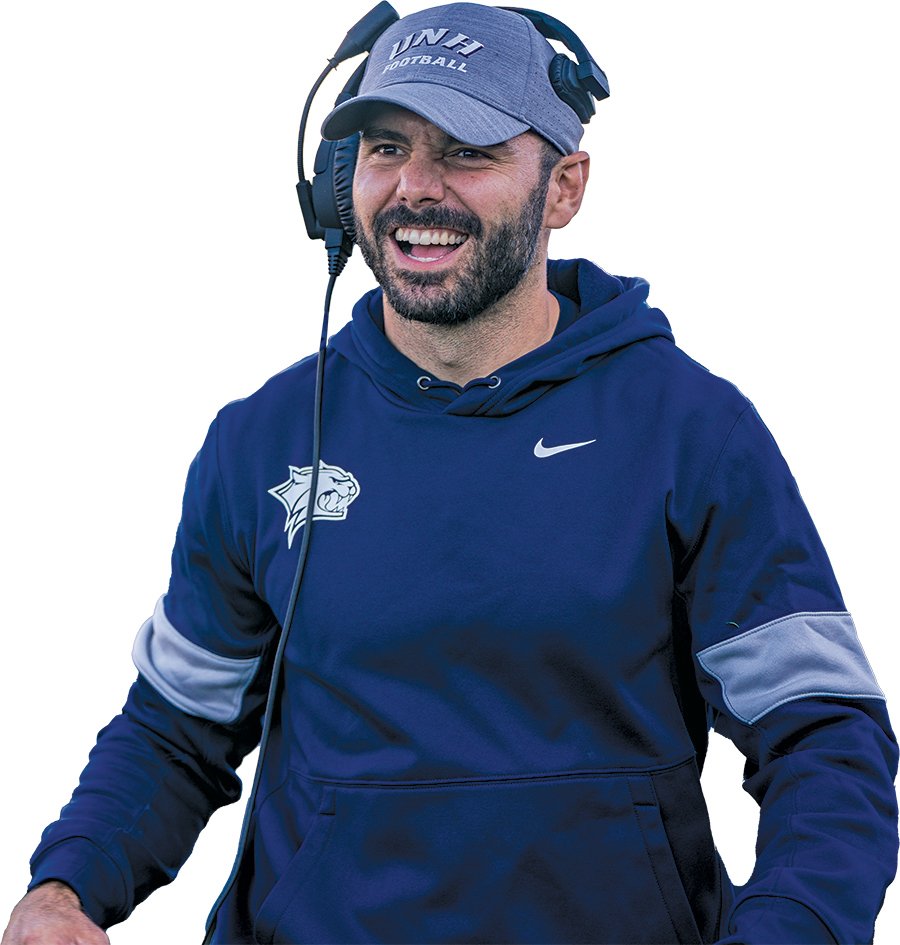
The win at Georgia Southern ranks as one of McDonnell’s greatest UNH memories. The Wildcats made a statement that day: They were going to be a tough team to beat — in the tournament or any time.
Santos also has fond memories of the game.
“I think that was a pivotal moment,” he says. “We lost the next week, but that Georgia Southern game gave us so much confidence going into the off-season. We felt that if we can beat that team, we can establish ourselves as a perennial top team in the country. I think we did that.”
The Wildcats, driven by the legacy of Coaches Bill Bowes and then McDonnell, will seek to do it again in the Rick Santos Era.